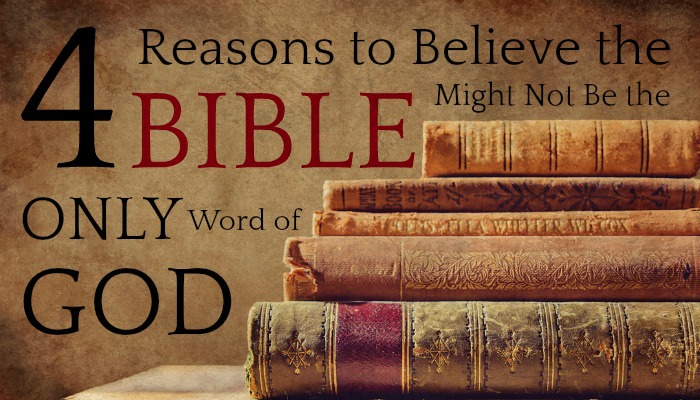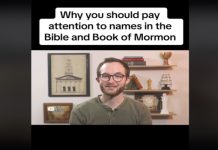
The Holy Bible is the word of God. That needs to be abundantly clear. We members of The Church of Jesus Christ of Latter-day Saints believe in it, study it and seek to live its teachings. But, if you’re familiar with our religion, you already know that we also believe in additional scripture. That doesn’t sit well with a lot of people.
 Unfortunately, many people, even personal friends, will be offended by the very idea that there might be more scripture than what is recorded in the Bible. The possibilities presented in this article are in no way meant to override or diminish the authority of the Bible just as the advent of the New Testament did not detract from the Old Testament. On the contrary, this article celebrates the idea that God spoke to other people, at different times, in different places, that affirm and clarify what is already recorded.
Unfortunately, many people, even personal friends, will be offended by the very idea that there might be more scripture than what is recorded in the Bible. The possibilities presented in this article are in no way meant to override or diminish the authority of the Bible just as the advent of the New Testament did not detract from the Old Testament. On the contrary, this article celebrates the idea that God spoke to other people, at different times, in different places, that affirm and clarify what is already recorded.
1. The origin of the exclusivity of the Bible as the word of God is a misinterpretation
Where does the notion that the Holy Bible is the only written word of God come from, anyway? Let’s take a look at Revelation 22:18-19, which is often cited as evidence of a concept called Sola Scriptura, which is just a fun name attached to the belief that the Bible is the stand-alone, complete authority on the word of God:
For I testify unto every man that heareth the words of the prophecy of this book, If any man shall add unto these things, God shall add unto him the plagues that are written in this book:
And if any man shall take away from the words of the book of this prophecy, God shall take away his part out of the book of life, and out of the holy city, and from the things which are written in this book.
There you have it, right? Only the Bible is God’s word. There it is, plain as day. Simple as that.
Well, maybe not. Just hear me out. Check out Deuteronomy 4:2:
Ye shall not add unto the word which I command you, neither shall ye diminish ought from it, that ye may keep the commandments of the Lord your God which I command you.
Deuteronomy appears towards the beginning of the Old Testament. Revelation is the last book of the New Testament. Notice the similarities? Again, we get the “don’t add or take away” commandment. If we interpret Moses’ commandment not to add to the Bible the same way we interpret the Revelation version, every book after Deuteronomy would be in strict violation of this scripture, and therefore void. But it’s not void. We see the dilemma, right?
An alternative interpretation
Here it is: John’s warning in Revelation only applies to the book of Revelation.
Moses’ warning only applies to the book of Deuteronomy.
The fact is that many books from the New Testament hadn’t even been written by the time John wrote this scripture. In fact, the Holy Bible as we know it today hadn’t yet been compiled.
So, is it OK to add to John’s book of Revelation? No.
Is his scripture a binding declaration of the cessation of written scripture altogether? No.
2. The Bible itself speaks of other scripture-type books not included in the final version of the Holy Bible
OK, this is actually really fascinating. Check out this list of Bible references (mostly from the Old Testament) that mention other books and prophets whose words are not included in the Bible:
- the Wars of the Lord (Numbers 21:14)
- the Book of Jasher (Joshua 10:13; Samuel 1:18)
- the Acts of Solomon (1 Kings 11:41)
- the Book of Samuel the Seer (1 Chronicles 29:29)
- the Book of Gad the Seer (1 Chronicles 29:29)
- the Book of Nathan the Prophet (1 Chronicles 29:29; 2 Chronicles 9:29)
- the Prophecy of Ahijah (2 Chronicles 9:29)
- the visions of Iddo the Seer (2 Chronicles 9:29)
- the Book of Shemaiah (2 Chronicles 12:15)
- the Book of Jehu (2 Chronicles 20:34)
- Sayings of the Seers (2 Chronicles 33:19)
- an Epistle of Paul to the Corinthians predating 1 Corinthians (1 Corinthians 5:9)
- possibly an earlier epistle to the Ephesians (Ephesians 3:3)
- an epistle to the Church at Laodicea (Colossians 4:16)
- prophecies of Enoch known to Jude (Jude 1:14)
The list comes directly from this website. Check it out for a more thorough analysis of this general topic.
The reasons why these books weren’t included in the Bible are many. Surely, some haven’t been discovered. Some others may simply have been discarded or overlooked. One thing it does confirm, though: There were other prophets with written records of their prophecies that lived in the same era as other Bible prophets, but that were not included in the group of 66 books we now call the Holy Bible.
3. The Bible itself prophesies of future prophets
The Holy Bible is a compilation of separate books written by inspired men of God, many of whom we can safely call prophets (i.e. Moses) or at least men-who-prophesied, but more publicly held the title of Apostle (i.e. John the Revelator). With that foundation, let’s take a look at some scriptures, starting with Amos 3:7:
Surely the Lord God will do nothing, but he revealeth his secret unto his servants the prophets.
Alright, so at the very least we understand from this scripture that God reveals things to prophets. In fact, they seem awfully important to him. They reveal the words, intentions, warnings, commandments and teachings of God (i.e. the Bible). Now let’s look at Revelation 11:3, which speaks of the “last days” before the Second Coming of Christ:
And I will give power unto my two witnesses, and they shall prophesy a thousand two hundred and threescore days, clothed in sackcloth.
The Bible itself prophesies of future prophets, or at least men-who-prophesy. Doesn’t the existence of future prophets unequivocally imply that there is additional information God wants/will want to communicate to us? Doesn’t that unequivocally imply that there is more of the word of God to be had than just the Bible?
4. “Other sheep I have, which are not of this fold…”
The Holy Bible is the record of Christ’s interactions with the people of the ancient Middle East. But, have you ever wondered if He visited anyone else? And if He did, wouldn’t it make sense that those people would also write down those experiences?
Well … maybe He did.
In John 10:14-16 the Savior says (emphasis added):
I am the good shepherd, and know my sheep, and am known of mine.
As the Father knoweth me, even so know I the Father: and I lay down my life for the sheep.
And other sheep I have, which are not of this fold: them also I must bring, and they shall hear my voice; and there shall be one fold, and one shepherd.
So, a couple of things seem fairly clear from these verses. First, obviously, we’re not actually talking about sheep, we’re talking about people. Second, Christ references a people who had not yet heard His voice that He wanted to gather into His gospel. That’s great! Now, like all scriptures, this section is wide open to interpretation. Those not of our faith obviously interpret these verses differently than we do, but we believe these verses make reference to a people completely separate from those in the Middle East.
Who?
Check out this interesting scripture from The Book of Mormon, (the BoM tells the story of Christ visiting the inhabitants of ancient America after his resurrection):
And verily I say unto you, that ye are they of whom I said: Other sheep I have which are not of this fold; them also I must bring, and they shall hear my voice; and there shall be one fold, and one shepherd.
[Emphasis added] But it doesn’t stop there. Even in The Book of Mormon Christ says again:
And verily, verily, I say unto you that I have other sheep, which are not of this land, neither of the land of Jerusalem, neither in any parts of that land round about whither I have been to minister.
For they of whom I speak are they who have not as yet heard my voice; neither have I at any time manifested myself unto them.
But I have received a commandment of the Father that I shall go unto them, and that they shall hear my voice, and shall be numbered among my sheep, that there may be one fold and one shepherd; therefore I go to show myself unto them.
Which leaves the door open (at least to Latter-day Saints) for even more scripture in the future that has yet to be revealed.





